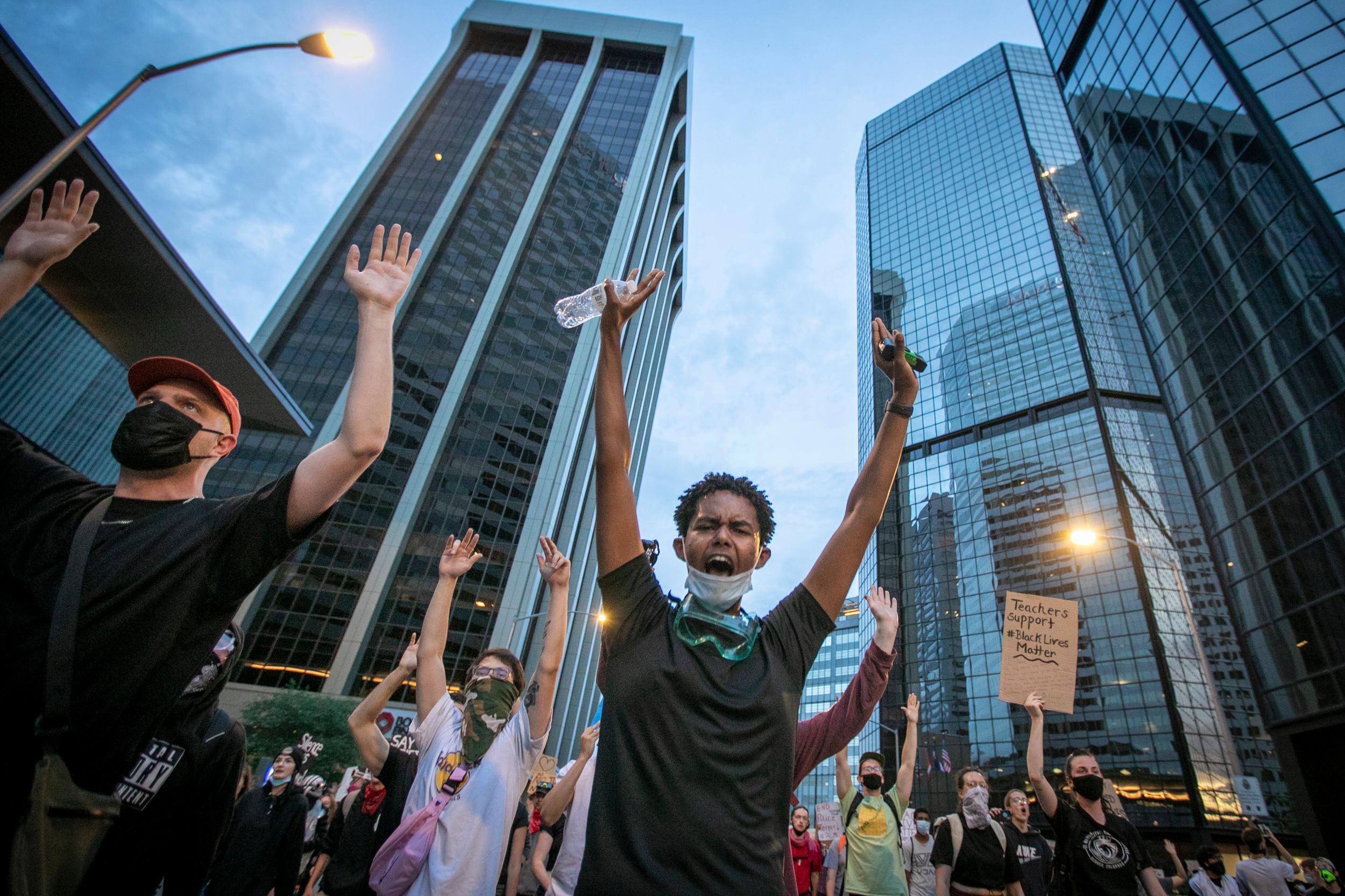
For a breezy Denver day in late May 2020, it was a familiar scene: large and loud protests. Chants of “Black lives matter! Black lives matter!” rang out.
On the west steps of the state Capitol, a group of young people held up signs. One is 24-year-old Sabre Morris of Denver. It wasn’t lost on her that she is protesting in the midst of a pandemic.
“I definitely am worried, like the guy next to me keeps coughing and sneezing without his mask on. It does scare me, especially because considering black communities are at a higher rate of receiving COVID-19,” Morris said.
The respiratory disease spreads through airborne droplets and close contact. Nearly everyone here wears a mask. One demonstrator walked around giving others a squirt of hand sanitizer, but social distancing is pretty spotty.
Morris said she knows she risks catching it by coming here, but it’s worth it to her.
“What worries me more is that I'll face police brutality or the next person that becomes a hashtag, I'll know them personally,” she said.
In remarks Tuesday, Gov. Jared Polis said that in the face of racial discrimination many feel the same.
“I respect the fact that many Coloradans who joined the protest concluded it is not possible to stay at home. It is not possible to remain silent,” the governor said.
He acknowledged that protesters earlier also felt it was important to speak out about the state’s stay-at-home order.
He urged those who attend a public demonstration to get tested a week afterward.
“Then they will know because it could be people they live with who should be warned, it could be their friends that they’re seeing in other scenarios,” Polis said. “There’s little meaningful contact tracing that can be done in that kind of large gathering.”
Theresa Anselmo, executive director of the Colorado Association of Local Public Health Officials, worries the disease could spread exponentially: One sick person infects three people, who infect nine people, who infect 27 people.
“We know that large gatherings are super-spreader events. That’s how the exponential growth occurs,” she said. “It is a very real fear that this will quickly get out of control again.”
She said protesters should be careful of who they interact with now and avoid those who are at high risk of the disease. Doctors advise wearing a mask, practicing social distancing, and sanitizing hands. Protesters talking loudly, singing, chanting, coughing could all spread the virus.
“We think that's much less common when people are outdoors, just because of the circulation of air and potentially because of sunlight and things like that,” said Dr. Bill Burman, who directs Denver Public Health. “But it still can occur. So that's the concern.”
Volunteers and community leaders have passed out masks, sanitizers and water bottles at the demonstrations, but so far there appears to be no official effort to promote safety or hand out literature on how to prevent spreading COVID-19.
“I think it's a good idea. I'm not aware whether that has been done,” Burman said.
“It's unfortunate that these two it feels like an understatement to call them events (the pandemic and the protests against police brutality) have happened simultaneously,” said Dr. Jandel Allen-Davis, president and CEO of Craig Hospital.
She has marched in Denver’s annual Marade and says protesters have a difficult choice.
“At a time where we need to socially distance, it's a tough, tough calculus to maneuver,” Allen-Davis said. “My belief, therefore, is that to the extent that you can minimize the risk through the things that we've talked about, you should do them and yet it's hard to have a show of solidarity and be six feet apart.”
She has two practical pieces of advice for people protesting: to march at the side of the street rather than the heart of the crowd and to avoid hugging.
In the meantime, people have raised concerns over law enforcement using chemicals that can irritate the throat like tear gas during a pandemic. Denver Mayor Michael Hancock acknowledged the dangers of “possibly coughing and removing the mask as a result of the responses of law enforcement.”
The mayor also said he worries about the potential economic fallout of “another peak to quite frankly, break a lot of businesses and even set our economy further back.”
Hancock advises that protesters get tested, in order to help the community. Free tests are available at the Pepsi Center from 8 a.m. to 4 p.m. daily, no questions asked.









